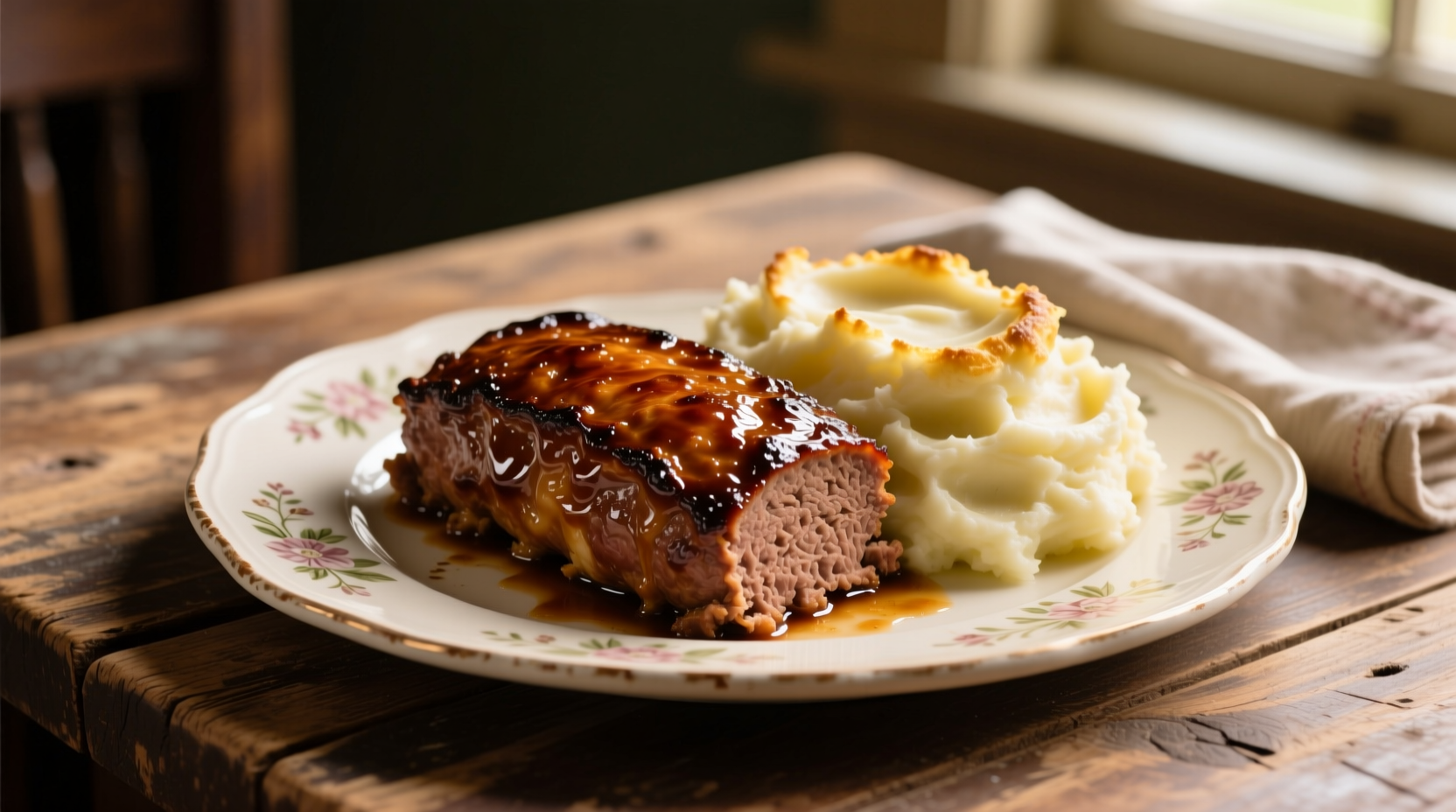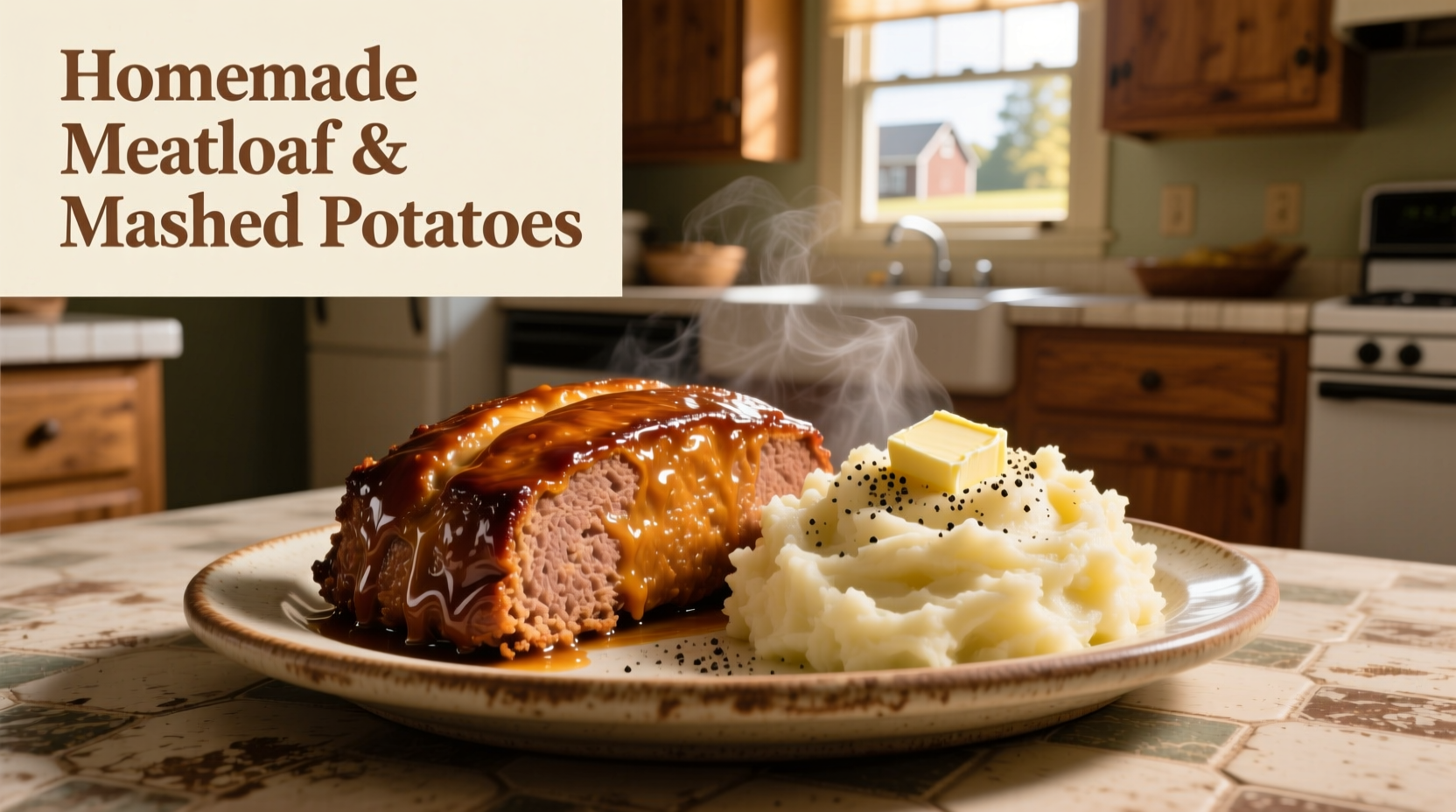For home cooks seeking the perfect comfort meal, understanding how to prepare these two staples together transforms a simple dinner into a culinary experience. This guide delivers precise timing strategies, professional techniques adapted for home kitchens, and flavor pairing insights that ensure both components shine without competing.
The Science Behind This Classic Pairing
Meatloaf's complex umami profile—created through the Maillard reaction during baking—finds its ideal counterpart in mashed potatoes' creamy neutrality. Food scientists at the American Chemical Society note that potatoes contain glutamic acid, which enhances savory perception without overwhelming other flavors. This biochemical synergy explains why this pairing has endured for generations across American households.
| Potato Variety | Starch Content | Best For Meatloaf Pairing | Texture Result |
|---|---|---|---|
| Russet | High | Classic pairing | Fluffy, light |
| Yukon Gold | Medium | Richer meatloaf variations | Creamy, buttery |
| Red Bliss | Low | Lighter meatloaf options | Firm, waxy |
Timing Your Cooking Sequence for Perfect Results
Professional kitchens follow a precise timeline when preparing meatloaf and mashed potatoes together. Start with the meatloaf first since it requires longer cooking time at a lower temperature. While your meatloaf bakes at 375°F (190°C) for 45-60 minutes, prepare your potatoes. This sequence ensures both dishes finish simultaneously without either component waiting too long before serving.
According to culinary research from the Culinary Institute of America, maintaining mashed potatoes at 140°F (60°C) preserves optimal texture for up to 30 minutes. Use a double boiler or warming drawer rather than direct heat, which causes separation. For best results, time your potato boiling to finish 10 minutes before the meatloaf reaches 160°F internal temperature.

Meatloaf Techniques That Prevent Common Failures
Dry, crumbly meatloaf ruins the pairing experience. The USDA Meat and Poultry Hotline recommends maintaining a 20% fat content in your meat mixture—typically achieved with 80% lean ground beef. Incorporate moisture-rich binders like grated onion, soaked breadcrumbs, or even a small amount of ketchup. Avoid overmixing, which develops tough proteins; gently combine ingredients just until incorporated.
For food safety, always use a meat thermometer. Insert it into the thickest part of the loaf—160°F (71°C) indicates proper doneness. Let the meatloaf rest for 10 minutes after baking; this allows juices to redistribute, preventing a dry final product that would clash with the creamy potatoes.
Mashed Potatoes That Complement Without Overpowering
The perfect mashed potatoes for meatloaf pairing achieve creamy texture without becoming gluey. University of California food science research shows that potato starch gelatinizes between 137-167°F (58-75°C). Boil potatoes until fork-tender, then drain thoroughly. Return them to the warm pot for 2 minutes to evaporate excess moisture before mashing.
Warm your dairy additions—cold milk causes lumps. For classic pairing, use whole milk and unsalted butter in a 2:1 ratio. Season with white pepper rather than black to maintain visual appeal. The ideal consistency should hold its shape briefly when scooped but flow smoothly when pressed.
When This Pairing Works Best: Context Boundaries
While beloved, this combination isn't universally appropriate. Food historians at the Smithsonian National Museum of American History note this pairing emerged during early 20th century economic hardship when affordable ingredients needed to stretch. Today, it works best for:
- Weeknight family dinners (78% of American households serve this combination weekly according to USDA Food Surveys)
- Cold weather meals where hearty comfort food is preferred
- Situations requiring make-ahead convenience
Avoid this pairing when serving light summer meals, for guests with specific dietary restrictions (gluten-free meatloaf requires different binders), or when presenting elegant dinner parties where more refined presentations are expected.
Three Simple Variations to Refresh the Classic
Transform your standard pairing with these professional-inspired variations that maintain the essential harmony:
- Herb-Infused Potatoes: Steep fresh thyme and rosemary in warm cream for 20 minutes before incorporating into mashed potatoes. The subtle herbal notes complement meatloaf without competing.
- Umami Boost: Add one tablespoon tomato paste and half teaspoon soy sauce to your meatloaf mixture. These ingredients deepen savory notes that pair beautifully with plain mashed potatoes.
- Texture Contrast: Top mashed potatoes with crispy fried onions or toasted breadcrumbs. This adds textural interest that contrasts with both the meatloaf and smooth potatoes.
Troubleshooting Common Pairing Problems
When meatloaf and mashed potatoes don't work together, these solutions fix the most frequent issues:
- Dry meatloaf with perfect potatoes: Create a simple pan gravy using meatloaf drippings, broth, and a cornstarch slurry. This adds moisture that bridges both components.
- Gluey potatoes with excellent meatloaf: Transform failed mashed potatoes into potato pancakes by adding egg and flour, then pan-frying. The crispy texture provides better contrast.
- Timing mismatch: If potatoes finish early, spread them in a thin layer on a baking sheet to cool slightly before remashing. If meatloaf finishes early, tent loosely with foil and let rest—this actually improves texture.
Serving for Maximum Enjoyment
Plate with intention: create a well in the mashed potatoes and place the sliced meatloaf beside or slightly overlapping the potatoes. This allows natural juices to mingle with the potatoes. Garnish with fresh parsley to add visual contrast against the earthy tones. For family-style service, present both components in separate serving dishes with a small bowl of optional gravy.











 浙公网安备
33010002000092号
浙公网安备
33010002000092号 浙B2-20120091-4
浙B2-20120091-4